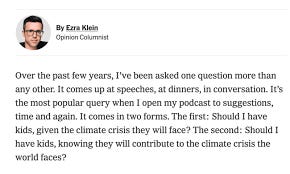More People is Better
The economic & environmental case for increasing population size
Housekeeping: This week on Moment of Zen, we spoke to Alana Newhouse (the Jewish Balaji) from Tablet on the right way of thinking about the central divide in our politics.
This week’s Upstream is with Kevin Kelly:
This week’s Media Empires is with Blake Robbins
When I was in college, overpopulation was the big concern. There were too many people on this planet, and having kids was problematic. A decade later, we’re all worried about underpopulation. What happened?
Overpopulation or underpopulation?
Malthus was the original fear-monger on the topic of overpopulation. He argued that if societies had a surge in the birth rate, society wouldn’t be able to feed itself because agricultural output wouldn't grow in lockstep—and as a result there would be famine. Malthus was actually right as a historian, more people did mean fewer resources per person. But what happened with the industrial revolution is we figured out how to get income and population growing in tandem, thanks to productivity growth.
Once we realized we could couple population growth and economic growth, we had created a new problem to worry about: Depleting Earth’s natural resources and destroying the environment. (Or so we worried!)
The industrial era was a period of amazing growth and human prosperity, but it was really tough on our planet. It looked like there was this trade off between our prosperity and the health of the planet. This is the era in which I grew up, where overpopulation was still the big concern. Sure, Malthus was wrong, we could couple population and income growth, but still, the environment couldn’t handle this many people. In a world of limited resources, we’d both use up our resources and then fight about them as we were running out, the fears went.
Dematerialization
Fortunately, Malthus was wrong here too. Just like we figured out how to couple population and economic growth, in the last few decades, we’ve also figured out how to decouple economic and population growth from resource usage. In short, we can grow our population and economy while also taking better care of the earth and treading more lightly on it.
Andrew McAfee, in his book, “More from Less”, calls this process ‘dematerialization’.
What led to dematerialization? Well, capitalism. The quest for higher profits is always a simultaneous quest for lower costs, which means being more efficient. This makes intuitive sense: Our cell phone replaced our need for a camera, answering machine, and lots of other physical equipment. We swapped atoms for bits, and became more resource efficient in the process.
People point to a more sustainable way of living historically, but the simple fact is that how we used to live may have fit a world of 10 million people—but it won’t fit a world of 8 billion. No one ever said the quiet part out loud, though, which is that the only way to decrease our population is to kill people, limit the aid you give to sick people, and/or stop new people from being born.
And since we don’t want to do any of that, the only way out is through. Thankfully we’ve made progress here: Largely because of the fracking revolution, we're burning less coal and using more natural gas to generate electricity, which means our total greenhouse gas emissions are actually now trending downward over time.
Ironically, we ended up seeing the opposite of what Malthus predicted: He believed the more resources you have, the more the population will grow. But in fact as countries have gotten richer, their population has sunk. In 1960, the average American woman had almost four children. Today, fertility has declined to less than about 1.7, below replacement.
Today, we suffer from underpopulation, not overpopulation. You wouldn’t think so based on all the overpopulation concerns.
Humans: good or bad?
I wrote a piece on Luddites that explained this phenomenon: “They share a similar ideology to the Unabomber [RIP] — that humanity is bad, humans are bad, humans’ impact on the world is bad, and that you shouldn’t have children because humans are bad for the planet.”
Indeed, for so many people, hell is other people. They don’t want more people to immigrate to America so they restrict visas, they don’t want more people to come to their city so they restrict housing, and they don’t want more people to have babies so they talk about overpopulation. You are the carbon they want to reduce.
But more people is better. It’s defensibly clear.
First, it’s better for quality of life and economic growth.
Economics advance through growth of market size on the demand side, and productivity growth on the supply side. On the demand side, you want more and more customers to sell your stuff to, and you want them to be richer and richer so they can buy more of your stuff. On the supply side, you want productivity growth, you want to make more stuff with less inputs, more revenue/lower costs, therefore higher margins, more profit.
How do you get demand growth? First, you need more customers, so constraining immigration cuts your number of domestic customers, and constraining trade cuts your number of foreign customers.
How do you get productivity growth? Through greater specialization and trade. More people means more people can specialize, which means greater productivity.
Second, more people is better for our environment.
Some of the climate change advocates want a lower population, they're viewing people as a stomach (as a consumer). But maybe one of those babies born will find the fix for climate change, maybe they'll finally get fusion to work or some other alternative energy source. Indeed, opposing population growth actually reduces the U.S.’s ability to cultivate and take advantage of brilliant people who could develop the technological advances to help save the planet.
Increasing population means more people want new energy solutions which increases the demand for innovation (more people to sell to, more $ for R&D), but it also means we have more people who can come up with the new energy solutions, which increases the supply for innovation. If you think there’s a brilliant inventor for every 10 million people, well then a billion more people gets us 100 more brilliant inventors who can invent new energy sources. People aren’t merely stomachs, they’re also brains.
Thirdly, it’s better for national security.
Why is China so powerful? Why does Hollywood censor their movies to fit Chinese sensibilities? Why does the NBA bend the knee to China? Because of their consumer market. China has the GDP per capita of Mexico. The reason they are incredibly powerful is because they have more people. To the extent one is worried about China, having more people is a solution.
To the extent you want your values to shape the world, you have to have more people. People are power.
Lastly, because it’s what women want. Studies show that women want more kids than they’re having, and so even on feminist grounds, this is a problem.
There are other great problems with a decrease in population. Just look at what happens in places where the population is declining. Look at rust belt cities like St. Louis, Detroit, Cleveland or other cities that have suffered large scale population decline. What services will governments or businesses provide to a city that’s shrinking? We talked about the environment earlier. The only way companies will be incentivized to invent new energy solutions is if there are sufficient customers to utilize them.
We already know what a zero population growth society looks like, we’ve experienced it for most of human history. It’s low quality of life, massive inequality and the institution of hierarchies and classes that we have escaped in high income societies.
If we have fewer kids, we’ll have lower dynamism, lower economic growth, and strategic insecurity in a future war. It’s existential.
Critically, it is not the number of people that matters most, but the ratio of young people to old people. Young people make things and buy things; they stimulate the economy. Old people do neither and take resources from the government. If you don’t have enough young people, you can’t support the old people and your society collapses.
This is not something we can fix overnight with birth rates. It takes 20 years to make more workers. So the best time to fix this was decades ago. The second best time is now, so that we can change things decades from now.
In the meantime, the only way we can fix our immediate problems is with immigration.
But immigration has fallen off a cliff too. Since 2016, immigration has fallen from 1m to 250K. In fact, there are now countries in the world where there are more Americans moving to those countries than from them. Whether it’s because of our restrictive policies, our provincial rhetoric, the rise of remote, or just the rise of economies all over the world, we’re not making it easier on ourselves.
Fertility woes
To be sure, this fertility issue is a global problem. Despite a population explosion in sub-Saharan Africa, the global fertility rate just hit 2.3 children per woman, just barely above replacement.
So what explains this crisis? When the world started to globalize, people didn't have to be on the farm, they could move into town and take manufacturing or service jobs. And they did this on a global scale. And when you live on a farm kids are free labor. But when you move into town, kids become an expense. A very big expense.
This process is speeding up. China went from living in pre industrial subsistence farms to high rise condos in less than 40 years. So their birth rate went from five or to seven children per woman to less than one in a single generation. So we're watching China now going from pre-industrial to post-industrial collapse in a single human lifetime.
Fertility rates are hard to reverse once you've urbanized. People have experimented with all sorts of experiments with mixed results. Putin offered cash prizes to women who had more children, and they’d have a baby and then drop the baby off at the orphanage. Swedes tried increasing maternity leave, but it resulted in no one hiring women below 35.
And yet, if women say they want more kids, what’s holding people back from having kids?
In the US, it’s expensive in several ways. First off, the opportunity cost is much higher than it used to be, since women are doing better than they’ve ever been in the job market. Second, it’s really expensive. Child care, housing, education, all of these costs are rising. Thirdly, there’s a real emphasis on careerism. When it is higher status to be a single, career achiever than being just a parent, it can make people less likely to have kids.
So what are the solutions here?
The jury’s still out. Maybe artificial wombs will help, but it still begs the question of “who raises them”? And it’s also quite controversial.
While the winning solutions are unclear, what we do know is that without more people in the next few decades, we will be facing a far more dire set of problems.
“More people is better” is a thesis I will be extrapolating upon in several future pieces on topics such as immigration, trade, and nuclear.
As Julian Simon said:
“There came to me the memory of reading a eulogy delivered by a Jewish chaplain over the dead on the battlefield at Iwo Jima, saying something like, “How many who would have been a Mozart or a Michelangelo or an Einstein have we buried here?” And then I thought, Have I gone crazy? What business do I have trying to help arrange it that fewer human beings will be born, each one of whom might be a Mozart or a Michelangelo or an Einstein—or simply a joy to his or her family and community, and a person who will enjoy life?”
Fortunately, there does seem to be a real pro-natalist movement burgeoning. Like religion, it’s in fashion again after everyone’s beaten up on it. Simon Sarris is an example of someone elevating the aesthetics of parenting. Elon having 10 kids also moves the overton window. Others are making the intellectual case. I’ll close with these provocative photos below, h/t Indian Bronson.











i agree with much of this but i can’t quite agree with the “more people means more inventors” ... the counter factual is europe from 1000-1700/1800 only had a couple tens of millions and worldwide only few hundred million people but even in these eras of smaller populations, they produced intellectual contributions and art pieces far greater than anything produced today, interesting no? ... refraining your productivity argument why not figure out how to boost the genius rate from .1% to 1% instead of just having more people, you’d get all the benefits with less people
I wonder how much modern assortative mating will contribute to productivity increases. Most people are meeting online now and filtering for higher standards (education, income, health, etc.). How much more 'productive' will the 1-2 children of the ideally/maximally matched couple be, vs. the 3-4 children of the couple that met through more happenstance in the past. (just a thought, and I'm not saying one is 'better' than the other)